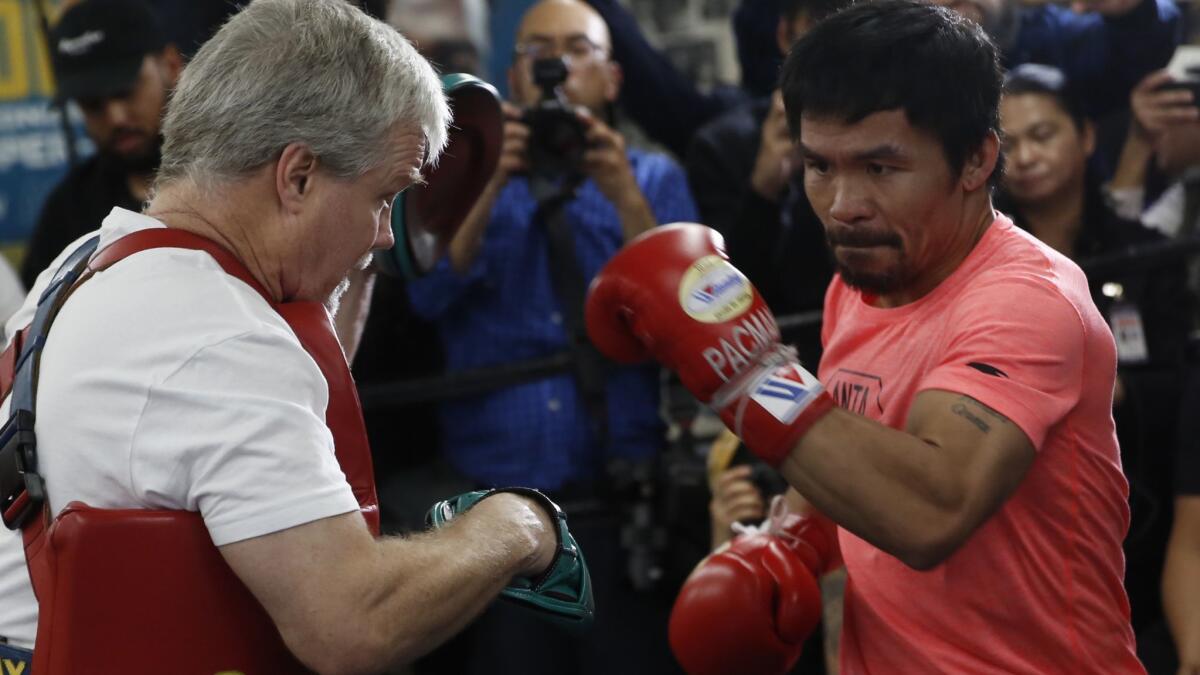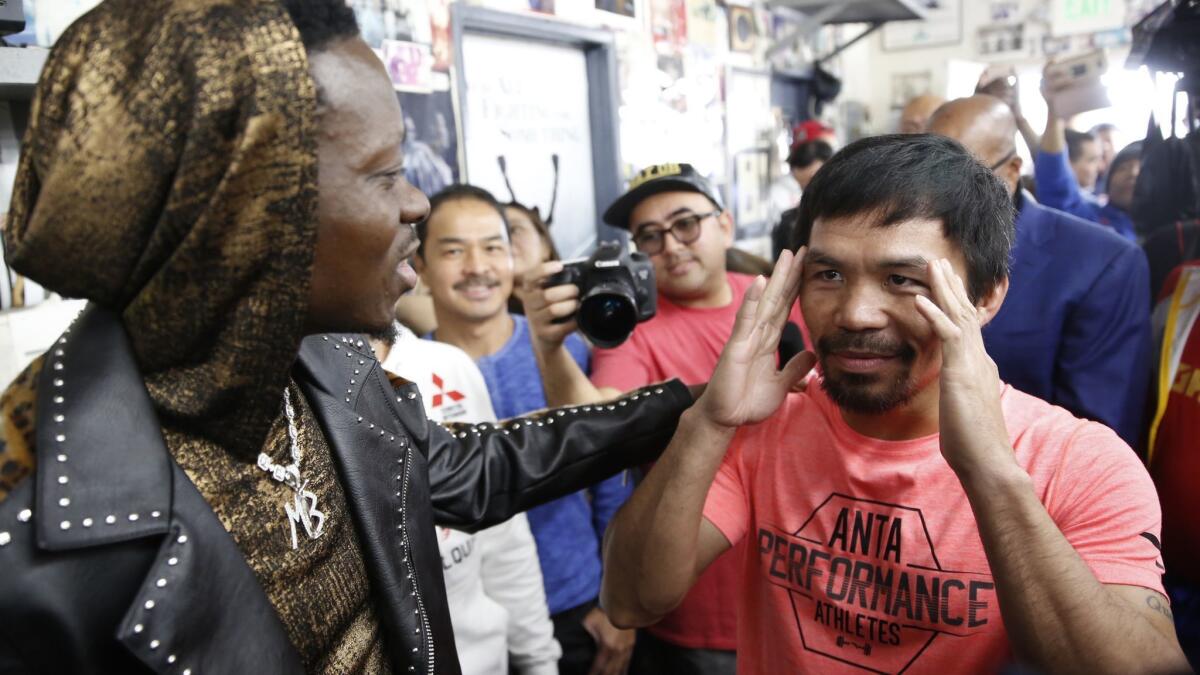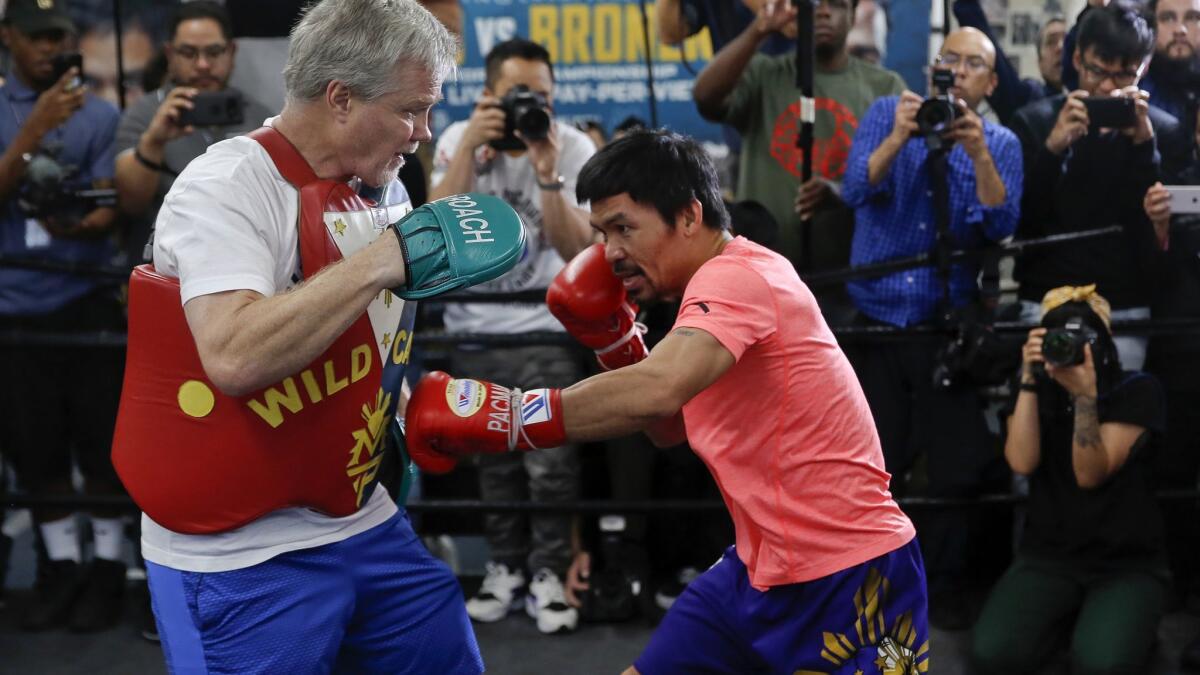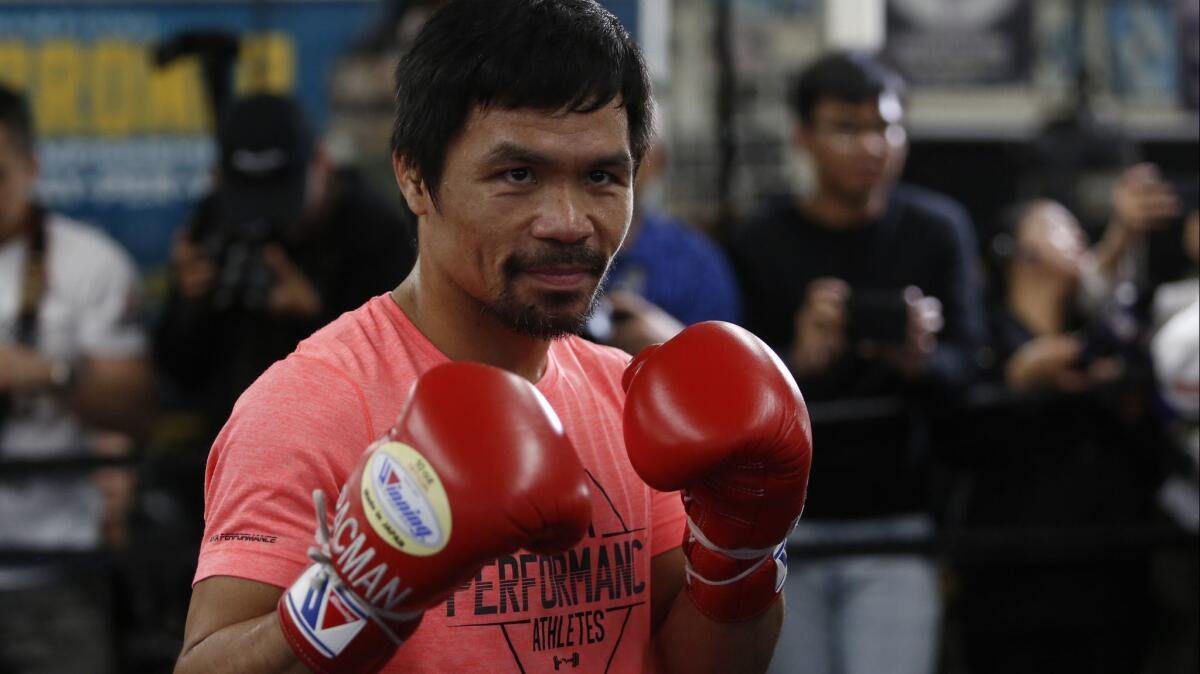Manny Pacquiao, Philippines senator, is out to prove sports and politics do mix

- Share via
The ever-wise Freddie Roach, who might have been Socrates before reincarnation as a boxing trainer, scrunches his nose at the question. He looks like somebody watching a snake eat a rat.
Can boxing and politics mix, actually co-exist?
“No,” he said. “Doesn’t work.”
He sees oil and water, nuns and tattoos, Mitch McConnell and Mike Tyson.
But Roach also knows he is wrong. His longtime prize pupil, Manny Pacquiao, is making it work and aspiring to do so at an even higher level.
Pacquiao is a boxer, one of the most successful of all-time. He is also a senator in the Philippines, one of 24 who help run the country. He turned 40 Dec. 17. You have to be 40 to be president of the Philippines. The next presidential election is in 2022. Some polls project Pacquiao as the winner.
Pacquiao’s boxing record is 60-7-2. He is the only fighter to win titles in eight different weight divisions. Roach has been there, as trainer of record, for most of it — until July 2017, when Pacquiao fought Jeff Horn in Australia.
“I kept telling Manny that it wouldn’t work,” Roach said recently during an interview at his Wild Card Boxing gym in Los Angeles, “that the political thing was messing us up. We’d train one day at 10 a.m., the next at 2 a.m. It didn’t work.”
Horn won, and so did politics. Roach got fired.
Roach is not the only one who thinks that punching and politicking are not hand in glove. An article on Deadspin by Tommy Craggs, just before Pacquiao’s 2010 election, said the move into politics was not only unworkable, but unseemly. Craggs wrote that by winning a Philippine election Pacquiao would thus gain “a position of prominence in two criminal rackets.” He also wrote that “being elected to office in the Philippines has historically served little purpose other than to enrich those who hold it.”
No mention was made of Imelda Marcos’ shoes.
::
In early May 2010, the Los Angeles Times sent me to the Philippines to report on the oil and water. Pacquiao, at the height of his boxing career, was running for the congressional seat. Election day was May 10.

I was joined by about a half-dozen other journalists, and what we experienced was fascinating. There is a current cable TV show about American politics called “The Circus.” We were living its inspiration.
Headquarters was Pacquiao’s home in General Santos City, a place few people outside the Philippines had heard of before Pacquiao laced on boxing gloves, even with its population of nearly 600,000. Pacquiao’s home was big and gated and hard to access, but also frequently had dozens of people hanging around outside. They were there because Pacquiao was known to often emerge and hand out money and food.
We stayed in a hotel where air conditioning was occasional, alternating with electrical outages. Elevator rides were a leap of faith. We spent most of our pre-election days in Pacquiao’s living room, waiting for him to arise from bed. A good target was 4 p.m.
We went on campaign rallies and sat on the stage behind Pacquiao as he delivered his message. We never understood a word, so we asked media members who were reporting for papers in Manila. They said they didn’t understand, either, because Pacquiao was speaking in a local dialect — and was conversant in many of those.
We knew him as cautious and slow to speak when talking about boxing in English. Here, he was animated, with lots of gestures — a real tree-stumping politician. When the rallies ended, we were ushered out by security people through huge crowds who cheered us like we were part of the team.
When Pacquiao finished at one rally, in Kiamba where he has another home, he decided to stay the night. The rest of us were three hours away from our place in General Santos City, and the decision was made that we would head back in a motorcade even though it was getting dark and the safest way to go anywhere in the Philippines was always going to be in tandem with Pacquiao’s bullet-proof Hummer. Now, that vehicle wouldn’t be along. We were split up in a half-dozen vans, with Michael Koncz, Pacquiao’s manager, going from van to van with assurances we were safe and would just “blow through the checkpoints.”
Those are words you never forget.
There were about a dozen checkpoints, each manned by soldiers with guns. I tried to remember if I had paid the life insurance premium and had told my wife about the new second mortgage. We were not in an especially dangerous part of the Philippines, but six months before, in the province of Maguindanao, about 10 hours north of General Santos, 58 people in a similar motorcade had been ambushed and killed. Their bodies were dumped in a mass grave and covered with banana leaves. Their sin had been that they accompanied some politicians in a trip to register to run for a local election.
Thirty-four of the people killed were journalists, including many from General Santos City. In a cemetery not far from Pacquiao’s home, those journalists were memorialized with a special walkway and signage, paid for by Pacquiao.

Koncz managed much of the news-gathering group. I asked him several times about the election process and its reputation for being dirty. One day, while we waited for Pacquiao to wake, Koncz quietly summoned me to follow him and showed me, in his bedroom, dozens of large boxes, so many he barely had a path to the bed. Each was filled with cash.
He explained this was not bribery, that the money would assure that his poll-watchers would be vigilant in watching the poll-watchers of the other candidate.
(A thought here: Maybe that would work in Florida?)
One day, Koncz took us on a two-hour ride to Pacquiao’s cock-fighting farm. Cock fighting remains wildly popular in the Philippines and fighting shows in Manila are big for both bird-owners and gamblers. The sport is simple, and fairly disgusting. Two birds equipped with razor blades on their claws are put into a caged ring and slash at each other until one wins. A great bird can make its owner a lot of money.
At Pacquiao’s farm, there were birds, each with a leg hooked to a stake, as far as the eye could see. We were shown around, witnessed a fight between two of the birds — without the razors — and then ushered into an adjacent dining room for dinner.
I was never certain, but I think we ate the loser.
Pacquiao has since divested himself of the birds and the sport, but still owns the farm and said, “It is full of beautiful trees and lots of fruits and vegetables, for the people to eat.”
On election day, Pacquiao rose, as usual, in late afternoon and joined us for the wait. He watched TV and the predictable stories of violence and voter fraud at the polls. He got a rubdown on the couch, then joined us at the dining room table, where his daughter, Queen Elizabeth, sat on his lap. “She was born in Los Angeles,” he said, “so she is a [U.S.] citizen.”
In the late evening, we were taken to a small cement-block election headquarters. Pacquiao campaign workers on laptops populated every corner, tracking the vote. Pacquiao strolled about, watching as results came in and were written on a big display board. Around 2 a.m., the first official count came in. He was leading; likely to win. His face was all smiles.
During a recent interview at a home he owns in Hancock Park, Pacquiao recalled that moment with relish.
“When I saw it, I felt so happy,” he said. “I was excited to serve the people. They were now my allies.”
He defeated Roy Chiongbian, whose family had controlled that Sarangani congressional seat for years.

Among the celebrants — the U.S. journalists figured it was OK to celebrate a Philippine election — was Pacquiao’s boxing promoter Bob Arum, who loves politics, loved being on hand for the election and was treated like royalty by the Filipinos. When Koncz delivered the official news at breakfast the next morning, Arum looked like a proud father.
::
It has been almost nine years since that election moment in Pacquiao headquarters. Pacquiao ran unopposed in 2013 for a second congressional term, then was elected to the Senate in 2016.
In that time, he has had 13 more big-money boxing matches, nine of them victories. There will be another bout Saturday against Adrien Broner at Las Vegas’ MGM Grand Garden Arena. It will be for the World Boxing Assn. (WBA) welterweight title (147 pounds). It will be Pacquiao’s 70th professional fight, and when it is suggested it won’t be his last he nods and smiles.
For the moment, the oil and water of boxing and politics continue to mix nicely.
Pacquiao trained much of early January at Wild Card Boxing gym, where he always trains for fights in the U.S. Most of the wall space in the gym is occupied by pictures of Pacquiao. Near one is a quote from George Foreman: “Sure, the fight was fixed. I fixed it with my right hand.” That is boxing’s attitude. This is boxing heaven.
Roach is still part of Pacquiao’s team and best of friends, and he will be in the fighter’s corner for the Broner bout, helping trainer Buboy Fernandez.
Pacquiao’s home is no more than a mile from the gym, and our recent visit reminded me of what it was like nine years ago. It was late afternoon — Pacquiao had slept in — and the house was filled with people, just like he likes it.
I wasn’t interested in questions about right hooks and predicted knockouts. Broner was never mentioned. The topic was politics, and I got quite a dose. Pacquiao’s take on the state of Filipino politics was eye-opening.
Nudged by Roach’s feelings on the subject, I asked why he ever got involved in politics in the first place. After the standard “I want to help the people,” he was off and running.
“I don’t want to say this, but for the last decade my country has been mismanaged,” he said. “It’s a good thing we now have a president [Rodrigo Duterte] who is for peace and order. But he can’t do it alone. It will take 10-15 years to fix the problem.”
Pacquiao runs the risk here of hitching his wagon to the wrong horse. Duterte has been widely criticized for advocating the killing of criminals — skipping the trials — and for inappropriate remarks about treatment of women. But Pacquiao sees the country’s problems as general leadership greed, more than Duterte’s quirky and scary leadership style.
“In the Philippines, they make politics a business,” he said. “There are lots of killings …”
If boxing remains his passion, pubic service is catching up.
He talked about how Philippine government corruption has allowed so much privatization of public money-makers — utilities, water companies, etc. — that the only way to replace the lost revenue is by raising taxes and “putting even more burden on the people.”
“I come from nothing,” he said. “My family had nothing, so when I was seven or eight years old my mind was already matured to make money, to find food. I used to take the old bread from a bakery, take it home, scrape off the mold and the crust and then we’d cook it. That’s how we ate. There were some days when we had just one meal, many when we had none.
“So, I tell the people now, if I am a corrupt politician, I wouldn’t give my money to you. I want to help you. I cannot say my life is good and then look at you in poverty.”
::
The incongruity of what Pacquiao is, and wants to be, is hard to fathom. It remains oil and water.
All evidence points to his country’s need for his passion, generosity and wits. All evidence also points to a given — that Broner will do his best to destroy some of those wits. Same for whoever comes after Broner. That is, after all, the job of a boxer.
The next Philippine presidential election is May 9, 2022. That will be one day shy of 12 years since I stood next to him and watched his joy as he entered the world of politics, the moment when he officially “could help the people.”
Now, more than ever, a question screams: Can the hope of a country also continue to be the toast of a sport where mayhem is the object and often the end result?
In a quiet moment at the gym, Roach sat on a stool waiting for Pacquiao.
“This politics thing,” he said, shaking his head. “He truly wants to help people. The problem is, the other politicians just want to help themselves. I worry about him.”
Reporter Dwyre was sports editor of the Los Angeles Times from 1981-2006. He has been honored with the prestigious Red Smith Award for outstanding contributions to sports journalism.
More to Read
Go beyond the scoreboard
Get the latest on L.A.'s teams in the daily Sports Report newsletter.
You may occasionally receive promotional content from the Los Angeles Times.











